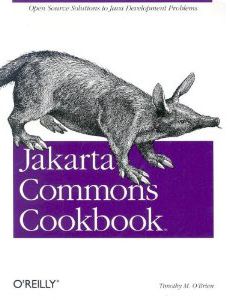 Review
ReviewTimothy chose a way to organize the book around common tasks, so the book is in the usual cookbook/recipes style. To me the cookbook style is rather verbose and there are many examples on minute details which make the book suitable for beginners. If you are experienced and have used Apache Commons before, the book is a quick read.
Although the book covers a lot of material, it is just a glimpse of the whole Apache Commons universe. An extensive description of all the Commons projects is impossible so squeeze into a book. Still Timothy wrote about the most important projects like Lang, Collections, IO, Math as well as about some Apache top-level projects like Velocity and Lucene.
The cookbook has been published in 2004 and shows its age. A few Apache projects described in it have retired in the meantime and some parts of the shown APIs are deprecated. Still only a few changes were needed to compile all examples against the newest versions of Commons libraries. So the content in the book is still relevant.
Examples
I wanted to keep all the source code of the book as a quick reference and as a source to copy from. Unfortunately O'Reilly did not provide the code for download or I just did not find it. So I extracted the code samples and expected output from the eBook based on their markup. My script parsed the eBook and saved the Java examples into packages derived from the chapter names and classes derived from the section names. It added a
main method and appended the expected output as a comment after the code. For example the extracted code for recipe 1.11 about finding items in an array looked like thatpackage com.discursive.jccook.supplements;
import org.apache.commons.lang.ArrayUtils;
public class FindingItemsInArray {
public static void main(String[] args) {
String[] stringArray = { "Red", "Orange", "Blue", "Brown", "Red" };
boolean containsBlue = ArrayUtils.contains(stringArray, "Blue");
int indexOfRed = ArrayUtils.indexOf(stringArray, "Red");
int lastIndexOfRed = ArrayUtils.lastIndexOf(stringArray, "Red");
System.out.println("Array contains 'Blue'? " + containsBlue);
System.out.println("Index of 'Red'? " + indexOfRed);
System.out.println("Last Index of 'Red'? " + lastIndexOfRed);
}
// Array contains 'Blue'? true
// Index of 'Red'? 0
// Last Index of 'Red'? 4
}And then I went overboard with this little project. For a week I worked to have all examples compile and run. This was hard work because the examples contained many syntax errors like missing semicolons or typos in variable names. These mistakes were no problem for human readers, but the compiler complained a lot. For some examples I had to second guess the code not shown, e.g. used Java beans or factory methods which had been omitted for brevity. In hindsight it was a stupid idea, but after successfully cleaning up more than half of the examples, I just had to finish the work. Remember, I am a completionist ;-)In the end I won and now all the examples are mine! I would like to share them with you, but O'Reilly does not allow that. The examples are distributed under some special "fair use" license that prohibits "reproducing a significant portion of the code".















